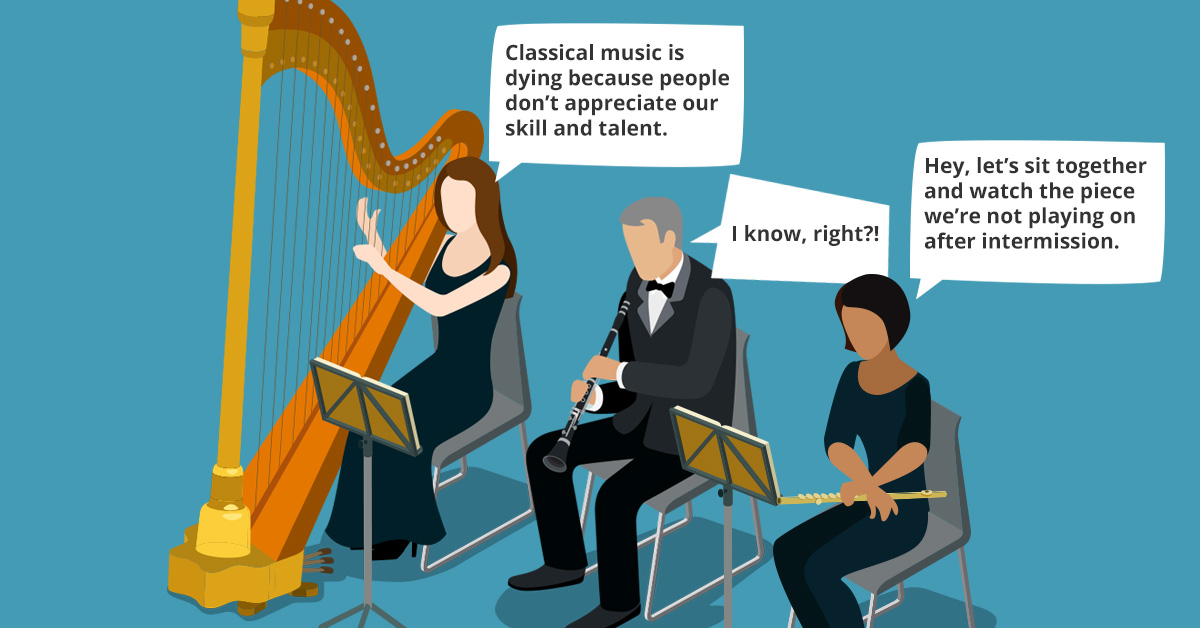News outlets worldwide have bombarded us of late with reports of sexual harassment and assault, as well as of sexual inequality in the workplace. The 2016 election prompted increased interest in women’s rights and opportunities and there has been great progress in many areas, but women still suffer various kinds of abuse on a regular basis. However we must not lose sight of the solid gains that have been made. These gains seem to indicate a change in culture, but will it be permanent? I have recently received requests to relate my experiences as a woman musician and the progress that has been made during my five decades as a professional musician.
There are two main topics, though intertwined, that must be dealt with: harassment and inequality of opportunity. All things considered, it is in essence an issue of respect.
As a student at the Indiana University School of Music in the early 1960s I would ask my teacher, Philip Farkas, if he thought I would ever be able to get a symphony orchestra job. His reply: “As long as you play twice as well as all the men.” Mr. Farkas was very supportive. He was merely relating the realities of the profession. The symphony/opera field was truly a “boys club.” It was normal to speak of the “men of the orchestra.”
But I took up the challenge. Over the next few years five auditions resulted in five contract offers. Consequently I never consciously felt that there was any discrimination. Keep in mind that this was the 1960s – there were no screens, no blind auditions, no orchestra committees, no repertoire lists. Fifty years later, due to all the news about sexual harassment, “glass ceilings,” maternity/paternity leave, etc., I now realize that many negative things did happen to me, things that are no longer considered acceptable, but at the time, it was all just “normal.”
My first job was in the Florida Symphony in Orlando. The conductor never called me by name – I was merely “the girl.” My next job was with the Houston Symphony where I was the first woman in the brass section and not particularly welcome in the “boys club.” Fortunately the conductor, Sir John Barbirolli, was always totally supportive and respectful. After an audition in 1964 for the Chicago Symphony Orchestra, the management expressed their wish to hire me, but ICSOM had recently ordered that auditions must be advertised and open to all, instead of the conductor and powerful musicians hiring whomever they chose, as was often done. So the opening was advertised and auditions were held again, with many more participants than the twelve who did the first audition. I couldn’t help but wonder if the audition confusion and indecision didn’t have something to do with the fact that I was the wrong gender. Maybe not. I was finally hired.
Many things happened that seemed normal and ordinary at the time, but are now being labeled harassment and assault. In my case, all negative issues were verbal, not physical, except one: I learned not to go up stairways in front of a certain man after having once been pinched. There were frequent comments and innuendos which would be unacceptable and considered abusive now. After a tour rehearsal in Carnegie Hall in 1965, the Chicago musicians were chatting with New York Philharmonic players. One of the New York players suddenly realized that I was not just someone’s wife, but a member of the orchestra. He very politely but matter-of-factly said: “We don’t have any women in our orchestra and we don’t want any.” At the time there were 5 women among 102 musicians in the Chicago Symphony. The New York Philharmonic hired its first woman in 1966.
On another occasion a Chicago free-lance player, after getting a bit inebriated at a party, told me that I should admit that the only way I got into the CSO was by sleeping with the conductor. Then there was the CSO player who was always asking me to wear a certain tight-fitting dress. Another suggested that it would be good for my career if I went to the beauty parlor regularly. A prominent guest conductor, after complimenting my playing, asked me to come to his hotel room to play for him. I did not. He was the music director of an orchestra many notches above the one I was in at the time (Florida Symphony), and the request seemed to offer a career advancement. Sound familiar? A bit like some of the things we are hearing on the news at the moment.
The examples could go on for pages, but the purpose here is to attempt to illustrate the progress that has been made. When I began in the Chicago Symphony Orchestra (1964-65 season), there were five women under contract. At the moment (2017-18) there are 38, 23 in the violins alone, compared to no female violinists my first few years. In the Philadelphia Orchestra and the Metropolitan Opera Orchestra there is a majority of women in the horn sections. There is a woman tuba player in the Philadelphia Orchestra. Is the problem of inequality solved? Definitely not. But the situation is much improved.
Another area where there has been progress is that of accommodation for such things as maternity and paternity leaves. During my tenure, the CSO offered no maternity leave. When I was pregnant and gave birth to my first child, I was entitled to three weeks sick leave, the same as all the men. Now the contract provides for thirteen weeks for pregnancy/childbirth, plus both parents can take a four-week paid parental leave. This is a big improvement, but our country still remains behind other advanced countries on this issue. For example, I read recently that Sweden offers 480 days at 80% pay, France offers six months with pay for each parent, and there are many other similar examples.
There are some women who don’t want to take part in a discussion such as this, not wanting to be labeled a woman musician. They want to be a musician, nothing more. But there is obviously still a need for this conversation. Everyone must feel safe from sexism, racism, harassment, inequality. We must have workplaces where all people feel respected. Are we truly a meritocracy where the path to achievement is open to all? Not really. But we are surely closer than we were 50 years ago.
This article first appeared in the March 2018 CFM Intermezzo. It was entitled “Equality and Respect in the Workplace.” It was then published in the Spring 2018 journal of The British Horn Society, The Horn Player, under the heading “From Our U.S. Correspondent,” Reflections from Nancy Jordan Fako on discrimination (and abuse) in the classical music world.


